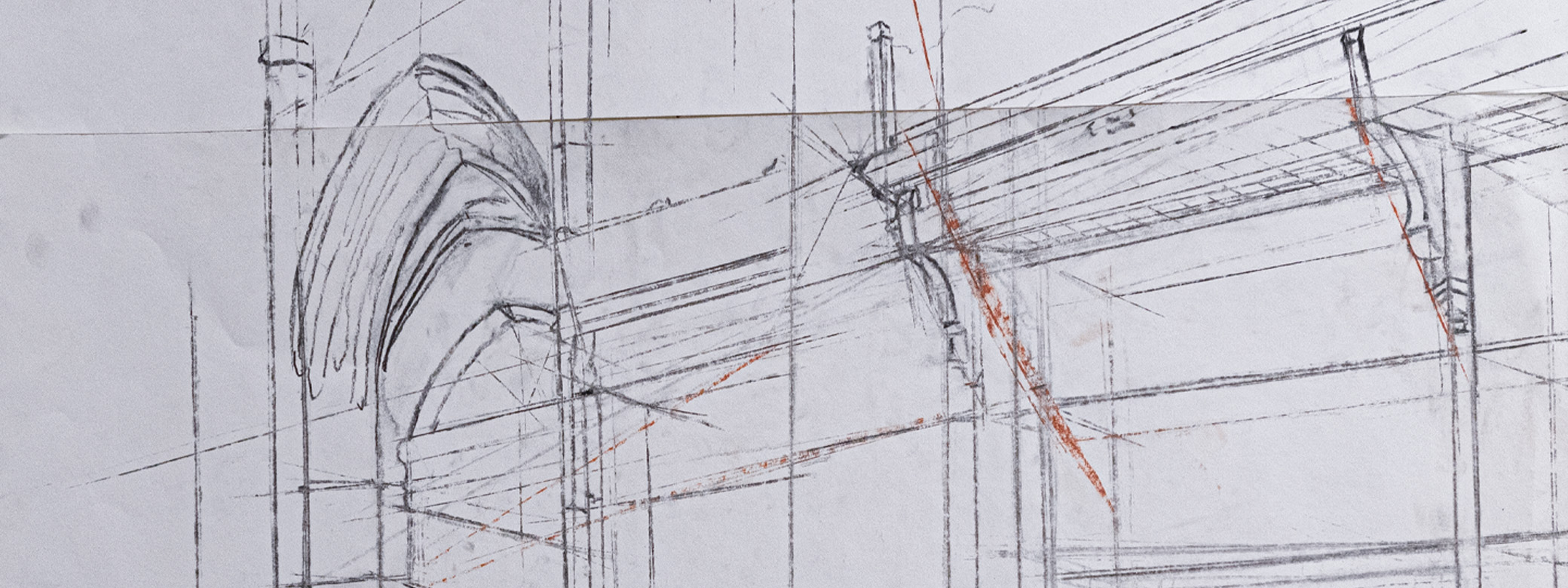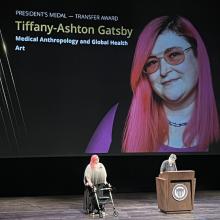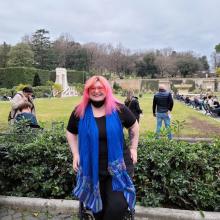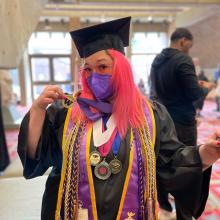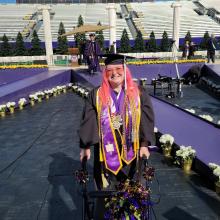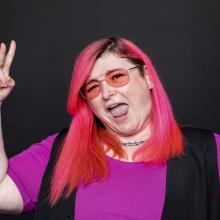Congratulations to Tiffany-Ashton Gatsby! They were one of two graduating University of Washington undergraduates awarded a 2022 President's Medal. UW President Ana Mari Cauce presented the medal to Gatsby on June 9 at the Awards of Excellence ceremony.
Gatsby received a Bachelor of Arts degree in Art in June 2022, with departmental honors and a concentration in Interdisciplinary Visual Art. They had a second major in Anthropology, specializing in Medical Anthropology and Global Health, and a Diversity minor. In 2021, Gatsby was selected as a member of the Husky 100. They were chosen by the Division of Art to be its undergraduate speaker at the School's 2022 Graduation Celebration.
We asked Gatsby a few questions after they received the President's Medal:
What does receiving the President’s Medal mean to you?
Being awarded the President's Medal was the pinnacle of my undergraduate education. As a queer-disabled returning adult student, my educational journey was not straightforward. Navigating disability accommodations, accessibility challenges — a pandemic — constant health issues, and all during a tumultuous period of social change, was not an easy path to traverse. However, the years I've spent dealing with complex social, institutional, and systemic issues gave me the tenacity not to 'overcome' my disability or 'closet' my queerness but to direct all of my available energy towards my studies and bettering my community in order to prove not only my worth and value as a student but as a representative of my community. I am so very honored and proud to provide visibility for queer-disabled individuals in academia who, like me, have to work a little harder to get through higher education but can still triumph academically!
Would you give us an example of how studying art has impacted your academic journey so far?
I think most art majors would agree that studying art is far more challenging and demanding than people may assume. Working in the arts often requires long hours of exhausting and often physically demanding creative labor, which can also be emotionally taxing. The type of vulnerability required to successfully study art is very different than what is required in other fields as the work art students produce is critiqued in a much more personal way than a biochem exam or a history essay, making us much more resilient to criticism. Tapping into this part of myself allowed me to examine my other areas of study through a different filter of inquiry unafraid of the consequences. It's easier to take risks when you're taught through the practice and critique of your work that failure is an inherently essential part of the process to making something meaningful.
We hear the you will be pursuing a PhD in Sociocultural Anthropology with a specialization in Medical Anthropology. What role will art play in that?
My research is directly tied to the connections between art and healing. I'm looking beyond personal artistic practice and art therapy to how healing through art is achieved on a broader community level. I explore how socially engaged art meant for public installation can provide powerful emotional and political healing, specifically in the queer-disabled community, by using art as a form of resistance to push back against marginalization. This is especially impactful for queer-disabled individuals dealing with traumas incurred through systems of care, including family and biomedicine. I hope to eventually establish spaces where queer-disabled individuals can come together as a community to create collaborative art and share their stories while pushing for visibility and equity.
Do you have any words of wisdom for current or prospective students of the visual arts?
I feel that involvement in the arts within academia provides students with an extremely valuable opportunity to think creatively, act expressively, and challenge the status quo. Art has a lasting impact over time and has the power to create lasting social change. It's more than just snapping a photo or putting paint on a canvas. Plus, there is a real joy to the creative process that I've found is a fantastic stress reliever — something every student needs! Whether someone wants to be a working artist or if practicing visual art is something that brings happiness in another way, the arts provide the opportunity to have a more fulfilling academic experience. Plus, there are opportunities to work with amazing equipment and processes that may not be readily available or affordable outside of a university setting. Take advantage of it while you're here and have a blast in the process!
